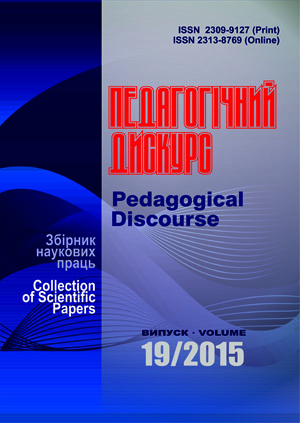The Features of the Initial Stage of Formation at Students-Biologists Motivation for Research Activities
Abstract
The study is dedicated to the issue of students underperformances during day-to-day classes and research activities in particular both of which negatively affects the qualitative personal traits of upcoming graduates.
One of the key points of the article is that there is a need in educating competent, motivated personnel that has an understanding of how does research industry works. A kind of scientists that are capable of defining study objectives, goals, conduct surveillance, its laws, analysises, being able to verify and proof the findings made.
Ability to pick valuable points from within of the information flow and the properly organized dataware is also highly appreciated and should help in creating value both in toto and while looking at the study subject in details.
It was found that there is a lack of specific information about the research ways of acquiring information related to the subject of the lesson.
Investigating vast array of publications and manifold scientific developments related to the field of motivation enabled us to schematicly display core directions of research activities which foster the curiosity of the research work as it is amongst the students.
During the experiment it was grounded that initial stage during which oneʼs values and motivation are developed should include constructive process of selecting objects of research, certain non-cliché value attitudes, arousing interest by setting a simple, step by step goals and achieving transitional results.
Results of the observations indicate that students that are making individual and collective choices based on discussion enables revitalization of their creativity, which overall ensures conditions to develop cognitive qualities.
One more colcusion drawn from the study is that the incentive system for upcoming graduates is of a great importance , as it prompts them to continue their studies.
The outlook for further researches related to enabling intrinsic student motivation towards scientific studies are: 1) allowing aforementioned students to pick objects of research on their own, and 2) select the way how experimental part of study will be conducted, to cultivate the creativity and cognitive traits of upcoming graduates.
Downloads
References
Halahan, A. Y. Mіrovуe tendentsіі v oblasti nauchnуkh іssledovanij vyssheho obrazovaniya (World trends in the field of sciens research of higher education) : nauchnoe izdanie / A.Y. Halahan, O.D. Prianyshnykova ; NYYVO. – M. : [b. i.], 1998. – 64 p. [in Russian]
Yechyna Yu. S. Naukovo-doslidnytska diialnist studentiv yak pidgruntia naukovo-tekhnichnoho rozvytku (Research activity of students as the basis of scientific and technological development) / Yu.S. Yechyna // Visnyk KNUTD. – 2012. –№ 5 – рр. 4.[in Ukrainian]
Korbutiak V.I. Metodolohiia systemnoho pidkhodu ta naukovykh doslidzhen: navch. posib. (The methodology of systematic approach and research ) V.I. Korbutiak. – Rivne: NUVHP, 2010. – 176 p. [in Ukrainian]
Maslou A. Motivatsyia i lichnost.( Motivation and personality) SPb.: Evraziya, 1999. рр.77–105. [in Russian]
Formuvannia piznavalnoi motyvatsii doslidnytskoi diialnosti studentiv (Formation of motivation of students cognitive research) / M. O. Kniazian // Pedahohika i psykholohiia profesiinoi osvity. – Lviv, 2003. – № 1. – рр. 173-181. [in Ukrainian]

















